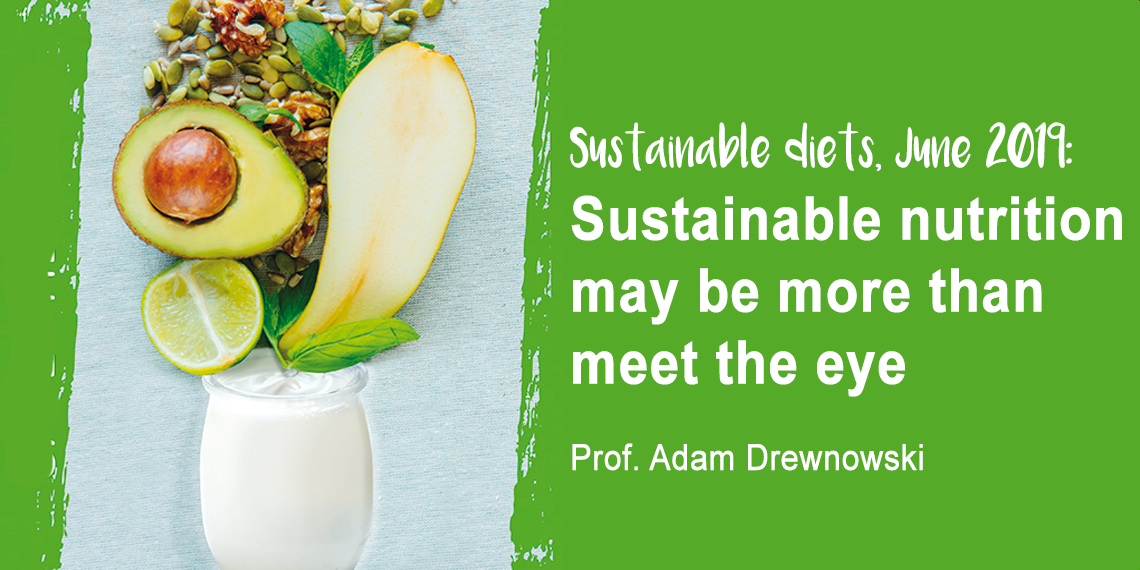Yogurt as part of sustainable diets: new research tools, metrics, and measures by Prof. Adam Drewnowski (University of Washington, USA)
Summary written by Azmina Govindji RD MBDA, Consultant Nutritionist & Registered Dietitian
This year’s YINI Symposium “Sustainable diets” took place in Baltimore on 10 June, during the American Society for Nutrition annual conference: Nutrition 2019. Dr Adam Drewnowski, Director of the Center for Public Health Nutrition, Professor of Epidemiology at the University of Washington and Director at UW Center for Obesity Research delivered an engaging presentation entitled Yogurt as part of a sustainable diet: New research tools, metrics, and measures.
He began with the FAO definition for sustainable diets:
Sustainable diets are nutritionally adequate, safe and healthy; affordable; culturally acceptable; accessible; protective and respectful of biodiversity and ecosystems, while optimizing natural and human resources.
Drewnowski asserts that foods need to be nutrient-rich, affordable, accessible, and appealing – as well as safe, (increasingly) natural, unprocessed, and with low impact on the environment. He referred to the simple petal model and made a visual comparison between the University of Cambridge diagram, which highlights the four domains of sustainability (health, economics, society and the environment) and Chanel® camelia.
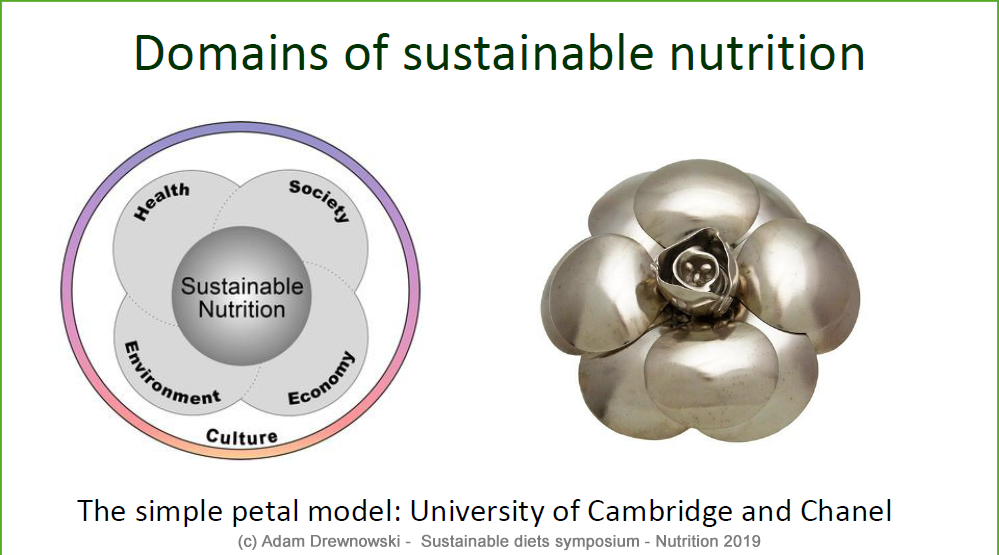
He went on to describe various models that depict these domains in more complex ways. The 4-dimensional approach embraces the viewpoint that these domains operate across different geographies, that is across space; they also evolve across time; and each domain has its metrics and measures – nutrient density, affordability and environmental impact.
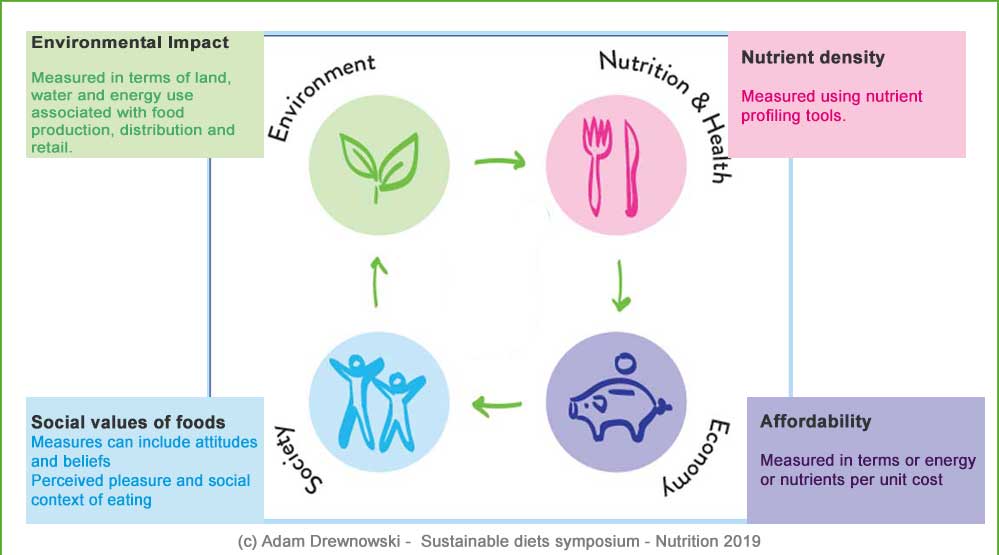
Protein Power
Drewnowski described the concept of nutrient density and the origins of nutrient density, outlining different nutrient profiling models which treat all protein sources as the same.
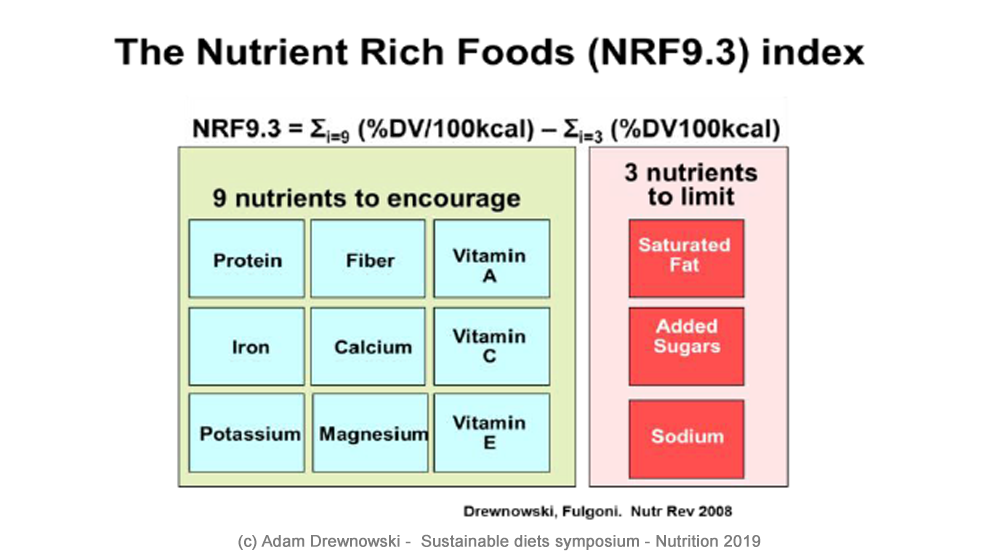
He referred to the EAT-Lancet Planetary Health diet which recommends that 86% of energy should come from plants. Since protein quality in foods can vary widely, Drewnowski questions whether nutrient profiling (NP) protein scores should be adjusted according to protein quality, by calculating % DV for protein per 100 kcal and by separating animal and plant proteins. He argues that the weighting needs to be more accurate, since plant proteins are not always as high in quality as animal and dairy foods such as milk.
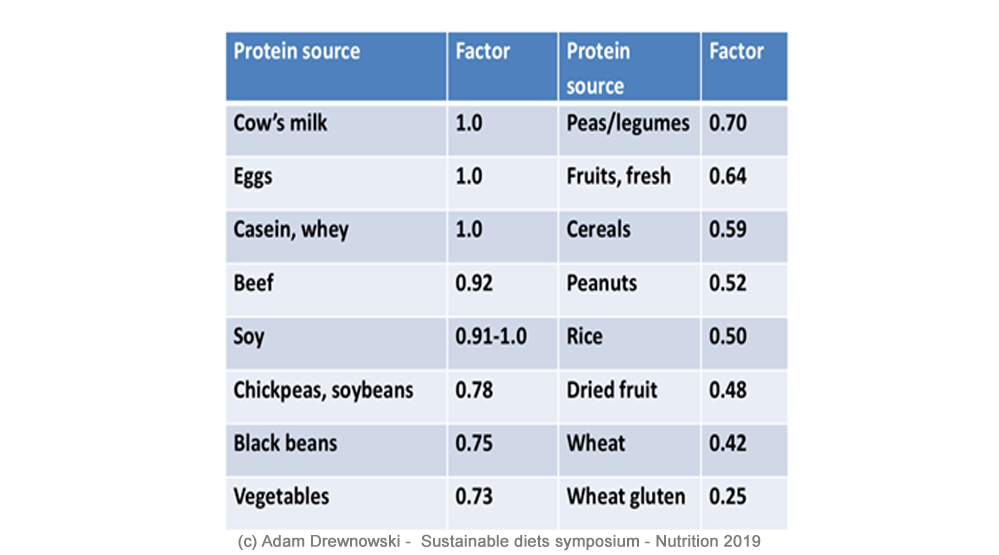
Protein content in NP models may need to be adjusted by protein source or by PDCAAS (Protein Digestibility Corrected Amino Acid Score). Further, milk and dairy are part of a long tradition of most cultures across the world, where milk is associated with motherhood and comfort.
All proteins are not created equal – Prof. A. Drewnsowski – YINI Symposium, Nutrition 2019
In conclusion…
Drewnowski believes that the Nutrient Rich Foods Index (NRF) needs to be adjusted for protein quality, and that we need to express GHGEs (and other environmental costs) per kcal or per nutrient and not per kg of food. He ends by suggesting that there will need to be some tradeoffs if we are to optimize diet quality at an affordable price while minimizing environmental impact, and makes a plea for new metric measures and models based on high quality data.
Application in dietetic practice
With the increasing popularity of vegan, plant-based and flexitarian diets, and the desire to “do our bit” for the planet, dietitians are particularly well-placed to deliver culturally appropriate and tailored nutrition advice that also includes an emphasis on sustainability, affordability and accessibility. Incorporating more plant-based foods into a varied diet has always been a part of dietetic practice; nutrients such as high quality protein as well as vitamin B12, iodine and calcium need to be considered as part of menu planning advice as patients attempt to move towards more sustainable eating.
3 points to consider
- Plant proteins vary in the quality of protein they provide, and many dairy alternatives do not provide the same mix of essential amino acids as cow’s milk and yogurt. Dairy contains a robust nutrient package not found in other commonly consumed protein-providing foods, which are essential for maintaining bone and muscle. When giving advice, particularly to groups such as women in their 40s and 50s who are starting to lose muscle mass, consider including a regular intake of dairy products. Where dairy is not acceptable, direct patients towards alternatives that offer the range of essential amino acids – soy protein provides high quality protein. Note that yogurt is still acceptable in lactose intolerance. Research has consistently shown that most people with lactose intolerance can better tolerate yogurt compared to standard or unfermented milks, so nutrient dense yogurt with its high-quality protein can still be included in a low lactose diet.
- Moving towards a more sustainable eating plan might include replacement of meat-based meals with beans and pulses as an alternative protein source. Dairy foods supply important calcium, which is more bio-available than that found in plant-based sources. Patients may choose to “dip in and dip out” of plant-based eating by using dairy milk and yogurt on some occasions, whilst using plant-based drinks with breakfast cereals or hot drinks, for example. Maintaining an adequate intake of lower fat lower sugar dairy products will help to maintain good intakes of calcium and iodine, particularly where cow’s milk alternatives are not fortified.
- Lack of creativity in the kitchen may limit consumption of nutrients that are typically present in meat and dairy foods, and vegan convenience products may be ultra-processed. There has been a rise in popularity of vegan-based foods such as ready meals, sausages and burgers in supermarkets and restaurants. It may be wrongly assumed that vegan foods are healthier, so dietitians need to provide tailored information on healthier plant-based meals that provide a range of nutrients that offer an appropriate replacement for meat-based dishes.
Synthesis written by Azmina Govindji RD MBDA, Consultant Nutritionist & Registered Dietitian

